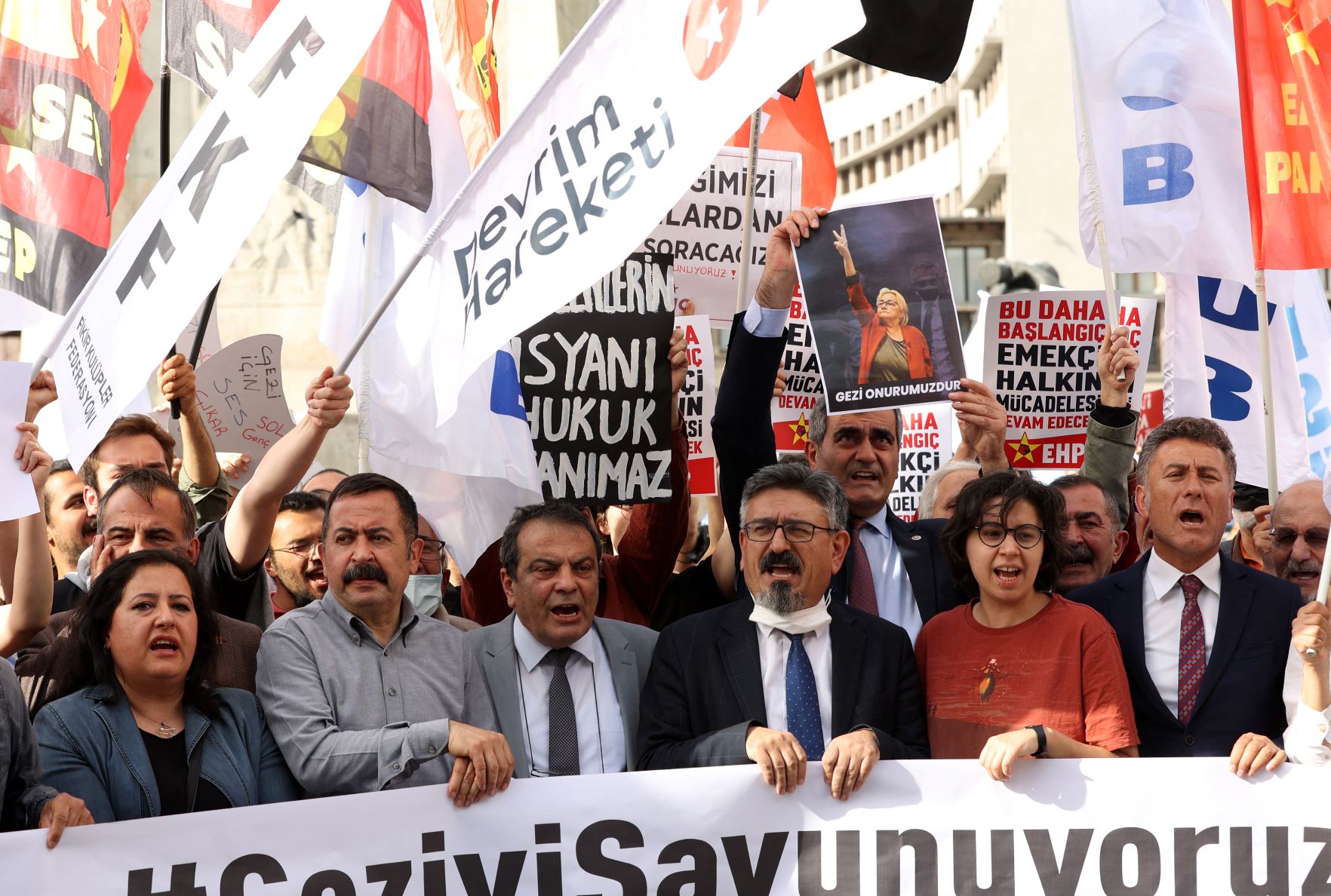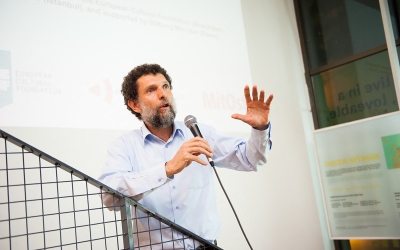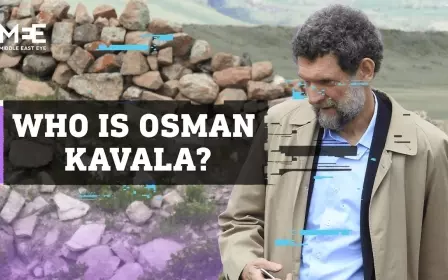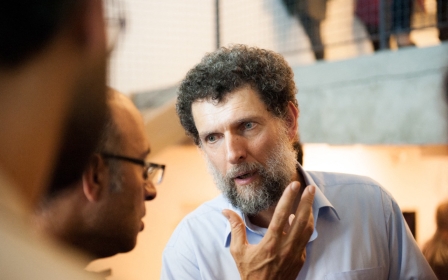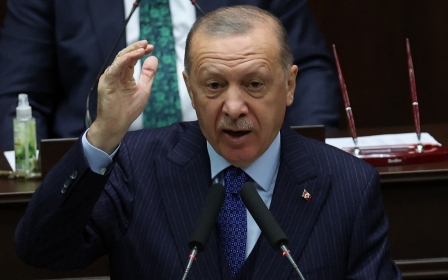Osman Kavala: Hundreds protest against life sentence as politicians promise release
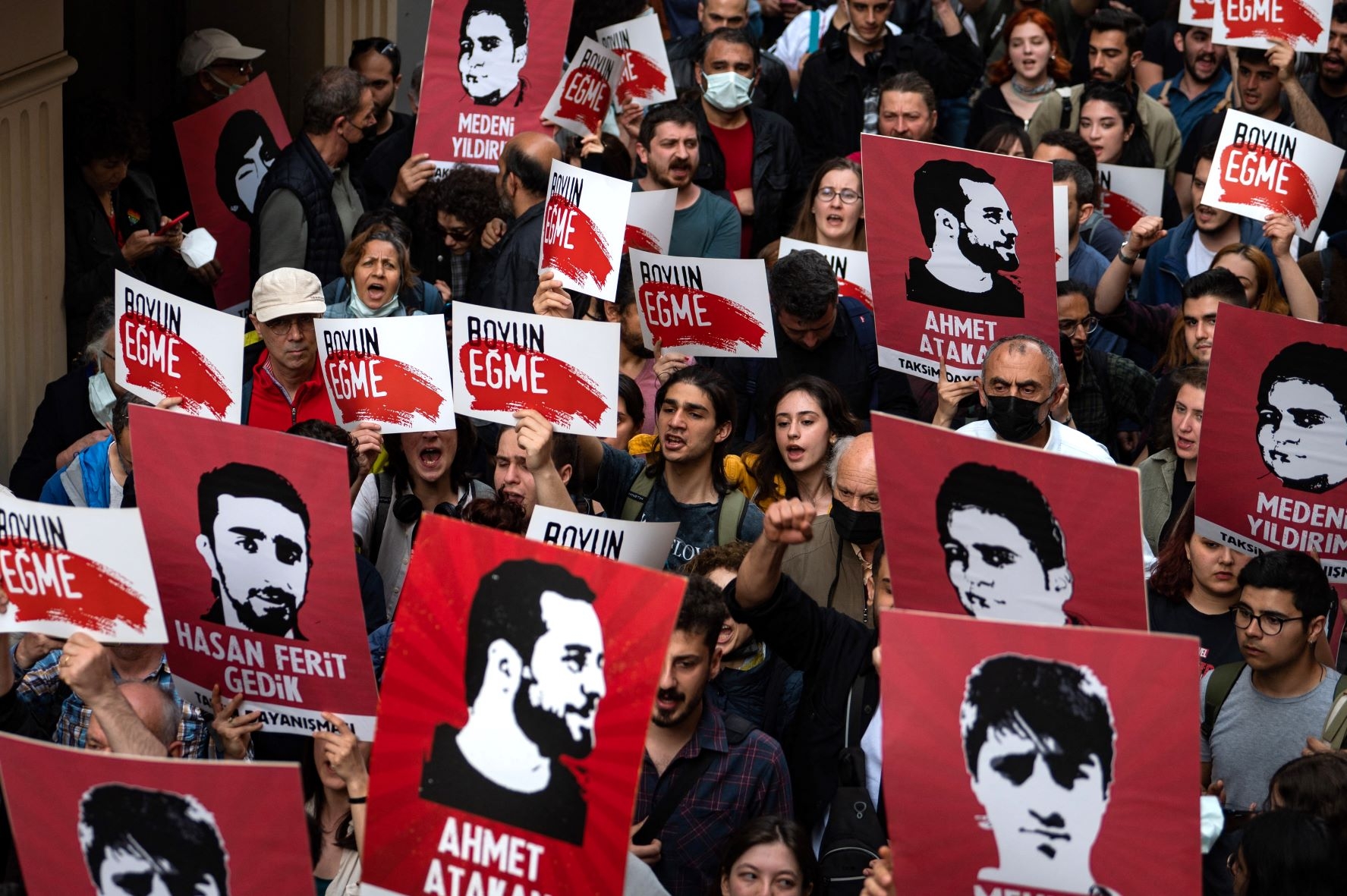
Opposition politicians in Turkey have vowed to pardon Osman Kavala, as hundreds of people took to the streets to protest at the life sentence handed down on Monday to the philanthropist.
Kavala, who spent more than four years in jail without a conviction, was sentenced at Istanbul's 13th Heavy Penal Court on Monday for his alleged part in the 2013 Gezi Park protests and an attempted coup in 2016. A number of other activists received 18-year sentences.
The sentences have provoked outrage inside and outside Turkey. The EU said it "profoundly" regretted the decision, while France called for his "immediate release". The US State Department released a statement on Monday in which it condemned the conviction and called on the Turkish government to "cease politically motivated prosecutions".
Around 400 protesters gathered on Tuesday near Taksim Square in Istanbul, the centre of the 2013 anti-government protests against then-Prime Minister Recep Tayyip Erdogan, to protest the jail sentences for Kavala and the seven other activists.
"Everywhere is Taksim, everywhere is resistance!" chanted the demonstrators. "This is only the beginning, the struggle will continue!"
In a speech to party members on Tuesday, the leader of the main opposition Republican People's Party (CHP) implied he would overturn the verdict if he is elected president.
"We will fight against those who place the judiciary under the orders of politics… and hold our people hostage in prisons," said Kemal Kilicdaroglu, a potential candidate for the presidential elections in 2023.
'A relentless travesty of justice'
Kavala, a founder of a number of organisations advocating inter-communal dialogue and democratic reforms in Turkey, was detained over allegations of involvement in the Gezi Park protests and the 2016 coup attempt.
In 2019, the European Court of Human Rights ruled that Kavala's detention was political and called for his immediate release, a request which has been repeated numerous times but has thus far been ignored by Turkey.
Milena Buyum, a senior campaigner with Amnesty International, told Middle East Eye on Monday that the verdict and charges had been "politically motivated".
"The files are absent of any evidence at all that could justify an aggravated life sentence," she said, referring to a sentence which prohibits any chance of release short of a presidential pardon or the sentence being overturned.
Buyum said the trial had been a "relentless travesty of justice, and with this outcome it has reached really epic proportions. The verdict makes a mockery of the judicial process," she said.
The verdict was greeted with outrage from rights groups on social media.
Sarah Leah Whitson, executive director at the human rights organisation Dawn, described the verdict as "devastating".
"The most baseless, absurd, cruel trial I've ever followed in my life," she tweeted. "I stand with Osman."
Monday's court hearing was plagued with technical problems, with muffled sound and a breakdown in Kavala's video link from Silivri prison. A number of defendants, such as Mucella Yapici, Cigdem Mater, Can Atalay and Tayfun Kahraman, were present in the courtroom, while others - such as American academic Henry Jack Barkey - were tried in absentia.
Speaking to the court, Kavala described the whole process as a "judicial assassination" and the accusations as "conspiracy theories drafted on political and ideological grounds". However, Justice Minister Bekir Bozdag dismissed foreign critics on Tuesday, saying no other country had the right to say anything about Turkey's judicial process.
'Red Soros'
What began as a May 2013 protest against the bulldozing of Gezi Park, one of Istanbul's last green spaces, eventually spiralled into widespread anti-government demonstrations. Millions took to the streets in opposition to the policies of Erdogan, citing increasing authoritarianism, gentrification, corruption and the erosion of the country's secular values.
Erdogan and other officials claimed Kavala was the primary instigator of the protests and was conspiring to overthrow the elected government.
Kavala was initially prosecuted for supporting the Gezi Park protests, but was later acquitted of these charges in February 2020.
However, he was immediately taken into police custody again, as part of another investigation linked to the July 2016 coup attempt.
Kavala had been imprisoned for 1,637 days without conviction, provoking harsh condemnation of Ankara both domestically and internationally.
Erdogan has previously branded Kavala the "red Soros of Turkey", in reference to his links to Hungarian-American philanthropist George Soros, whose support of liberal causes makes him a bete noire for many authoritarian-leaning governments.
Kavala's wife, Ayse Bugra, previously described his imprisonment as "torture" and has cited concerns about the spread of the Covid-19 virus in a number of Turkey's prisons.
"To have an idea about what my husband has been subjected to during more than 1,000 days of imprisonment, it is important to know the strange judiciary process through which he was arrested three times, released twice and acquitted once from different charges all based on the same investigation file," she told Middle East Eye in August 2020.
"He stays alone in a cell with a toilet and shower. He shares a small courtyard with another prisoner. He does not complain about the physical conditions and food - but then, he never complains anyway."
Middle East Eye propose une couverture et une analyse indépendantes et incomparables du Moyen-Orient, de l’Afrique du Nord et d’autres régions du monde. Pour en savoir plus sur la reprise de ce contenu et les frais qui s’appliquent, veuillez remplir ce formulaire [en anglais]. Pour en savoir plus sur MEE, cliquez ici [en anglais].


